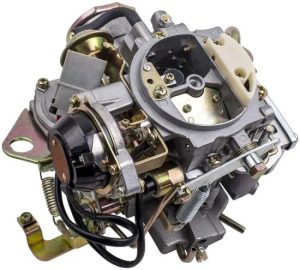For any driver, a malfunctioning engine is a cause for concern. But engine overheating is a particularly serious issue that can lead to significant damage or even complete engine failure. Understanding the reasons why an engine overheats empowers you to identify potential problems early on and prevent costly repairs. This comprehensive guide delves into the common culprits behind engine overheating, explores preventive measures, and offers valuable tips for responding to an overheating engine safely.
Beyond a Steamy Hood: Unveiling the Mechanisms of Engine Cooling
Internal combustion engines generate a tremendous amount of heat during operation. To prevent this heat from causing damage, a car’s cooling system plays a vital role in regulating engine temperature. Here’s a simplified overview of how the cooling system works:

-
Coolant: A mixture of water and antifreeze circulates throughout the engine block and cylinder head, absorbing heat.
-
Radiator: The hot coolant travels to the radiator, a network of fins and tubes designed to dissipate heat into the surrounding air.
-
Water Pump: A pump ensures continuous circulation of the coolant throughout the system.
-
Thermostat: This valve regulates coolant flow, allowing the engine to reach optimal operating temperature and maintaining it within a safe range.
-
Fan: An electric fan mounted near the radiator helps draw air through the radiator fins, further aiding in heat dissipation.
When any component of this system malfunctions, the engine’s ability to regulate its temperature is compromised, leading to overheating.
The Culprits Exposed: Common Causes of Engine Overheating
Several factors can contribute to engine overheating. Here’s a breakdown of the most common culprits:

-
Low Coolant Level: Coolant is essential for absorbing and transferring heat. If the coolant level is low due to leaks, improper mixture, or neglect of scheduled flushes, the engine will overheat.
-
Coolant System Faults: A malfunctioning thermostat, clogged radiator fins, or a faulty water pump can all impede coolant circulation and lead to overheating.
-
Oil Problems: Engine oil acts as a lubricant and coolant. If the oil level is low or excessively dirty, it loses its lubricating and cooling properties, contributing to overheating.
-
Faulty Cooling Fan: A broken fan motor, damaged fan blades, or a malfunctioning fan sensor can prevent the fan from operating properly, leading to inadequate airflow through the radiator and overheating.
-
Defective Engine Parts: A blown head gasket, a cracked engine block, or other internal engine problems can also cause overheating by allowing coolant to leak or by compromising the engine’s ability to transfer heat efficiently.
-
External Factors: In rare instances, extreme weather conditions or towing heavy loads can put an extra strain on the cooling system and contribute to overheating, especially if the system is already compromised.
By recognizing these common causes, you can be more vigilant in identifying potential issues and preventing engine overheating.
The Warning Signs: How to Recognize Engine Overheating
A car’s engine is equipped with a temperature gauge that indicates engine operating temperature. Here are some warning signs to be aware of:

-
Temperature Gauge: If the temperature gauge needle climbs above the normal operating range (typically indicated by the manufacturer), it’s a strong sign of overheating.
-
Steam Rising From the Hood: This is a clear visual indicator that the engine is overheating and coolant is boiling.
-
Burning Smell: A burning odor can signify overheated engine components or burning oil.
-
Loss of Power: An overheating engine may experience a loss of power or performance.
-
Unusual Engine Noises: Knocking or pinging sounds from the engine can be a sign of overheating.
If you notice any of these warning signs, it’s crucial to take immediate action to prevent further damage.
Taking Control: Responding Safely to Engine Overheating
If your car exhibits signs of overheating, here’s what to do:
-
Pull Over Safely: Turn on your hazard lights and find a safe location to pull over as soon as possible. Avoid stopping in traffic or on the shoulder of a highway.
-
Turn Off the Engine: Shut off the engine to prevent further heat buildup.
-
Don’t Open the Radiator Cap: The coolant system can be under extreme pressure when the engine is hot. Opening the radiator cap can lead to a scalding coolant spray.
-
Let the Engine Cool Down: Allow the engine to cool for at least 30 minutes before attempting to restart it. You can turn on the heater (if your car has manual controls) to help draw some heat away from the engine.
-
Check Coolant Level: Carefully pop the hood open and check the coolant level in the overflow reservoir (consult your car’s owner’s manual for the exact location). If the level is low, do not add coolant yet. Adding coolant to an overheated engine can cause cracks or warping.
-
Call for Assistance: If the coolant level is low or you suspect a more serious issue, call for roadside assistance or tow truck assistance. Do not attempt to drive the car further until the overheating problem is resolved.
Prevention is Key: Maintaining Your Cooling System for Optimal Performance
The best way to deal with engine overheating is to prevent it from happening in the first place. Here are some essential preventive measures:

-
Regular Coolant Maintenance: Schedule regular coolant flushes and replacements according to your car’s manufacturer recommendations. This ensures the coolant’s effectiveness in absorbing and transferring heat.
-
Coolant Level Checks: Periodically check your coolant level, especially before long trips. Maintain the proper coolant mixture as specified in your owner’s manual.
-
Visual Inspection: Look for signs of leaks around the radiator hoses, water pump, and other cooling system components. Replace any cracked or worn hoses or clamps promptly.
-
Oil Changes and Maintenance: Maintain a regular oil change schedule as recommended by your car’s manufacturer. Clean engine oil lubricates and cools components, preventing overheating.
-
Inspecting the Cooling Fan: Ensure the cooling fan is operating properly and the blades are free of debris.
-
Heed Warning Lights: Don’t ignore any warning lights on your dashboard, particularly the temperature gauge light. Address any warning signs promptly to prevent further problems.
By following these preventive measures, you can significantly reduce the risk of engine overheating and ensure your car runs cool and efficiently for miles to come.
Invest in Peace of Mind: The Importance of Addressing Engine Overheating
Engine overheating is a serious issue that should not be ignored. Ignoring the problem can lead to significant damage, including:
-
Warped Cylinder Head: Excessive heat can warp the cylinder head, leading to oil leaks and coolant leaks.
-
Blown Head Gasket: A blown head gasket is a serious engine failure that allows coolant and oil to mix, requiring costly repairs.
-
Seized Engine: In extreme cases, severe overheating can cause the engine to seize, rendering the car inoperable and requiring a complete engine replacement.
By addressing engine overheating promptly, you can save yourself from costly repairs and potential breakdowns. The cost of preventive maintenance and repairs for the cooling system pales in comparison to the potential expenses associated with engine damage caused by overheating.
Embrace a Smooth Ride: Equipping Yourself with Knowledge and Resources
Understanding the causes of engine overheating, recognizing the warning signs, and knowing how to respond safely empowers you to take control of the situation and prevent major issues. Here are some additional resources that you may find helpful:

-
Your Car’s Owner’s Manual: Refer to your car’s owner’s manual for specific information on your cooling system, coolant recommendations, and troubleshooting tips.
-
Online Repair Manuals: Several online resources offer detailed repair manuals for various car models. These manuals can provide step-by-step instructions for inspecting and troubleshooting the cooling system.
-
Reputable Repair Shops: If you’re uncomfortable performing any maintenance tasks yourself, consult a trusted mechanic or repair shop for a professional diagnosis and repair of your car’s cooling system.
By staying informed and taking proactive measures, you can ensure your car’s engine stays cool and your rides are smooth and enjoyable.



